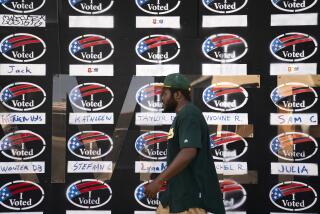A Hard Sell on Fear in L.A.
- Share via
There’s not much innate difference between the burglar alarm ad showing a burly masked man putting a crowbar to a window and President Lyndon B. Johnson’s notorious 1964 campaign ad depicting a mushroom cloud juxtaposed with a child picking daisy petals. Fear sells, whether it’s fear of crime or fear that the opposition (in Johnson’s case, Sen. Barry Goldwater) will lead the nation into nuclear war.
The political fear factor also brought us Willie Horton, the violent felon used by the 1988 campaign of the first President Bush to simultaneously exploit racial fears and call Michael S. Dukakis soft on crime. In the tight 2001 Los Angeles mayoral race, James K. Hahn’s widely criticized ad darkly linking rival Antonio Villaraigosa to crack pipes and cocaine dealers aimed at the same emotions.
Unfortunately, a local campaign for a sales tax increase to bolster public safety makes these others look like the Little League when it comes to fear.
The TV ad for Measure A shows a cowering mother with a small child, begging a 911 operator for help as a gloved robber/rapist/killer breaks in and heads for the bedroom. The measure’s Web page recently featured phony, clumsy newspaper “headlines” making a false claim -- “Crime at all-time high” -- and a peculiar blanket statement, “L.A. Streets no longer safe for children.” Sheriff Lee Baca apologized for the falsified Web ad. Where were he and L.A. Police Chief William J. Bratton when this junk was cooked up?
This editorial page endorses Measure A’s promise of increased police and fire protection. Tax measures need a good, strong sell, given that they require a two-thirds vote. But what are these ads, backed by the protectors of the city, really selling? This campaign’s only major media tool seems to be telling voters, over and over, that their hometown resembles a bad teen slasher movie.
Ted Brader, a University of Michigan expert in political advertising, notes that fear-inducing ads serve mostly to make viewers more attentive to facts about the issues raised. Voters may find out from the news that the Web ads are false, crime isn’t at record levels and middle-class neighborhoods aren’t plagued with violent home invaders. The result could be ballot backlash.
More to Read
Get the L.A. Times Politics newsletter
Deeply reported insights into legislation, politics and policy from Sacramento, Washington and beyond. In your inbox twice per week.
You may occasionally receive promotional content from the Los Angeles Times.










